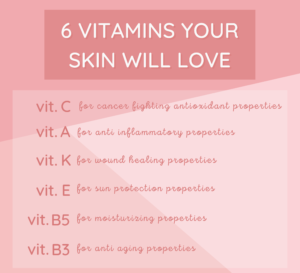6 Effective Vitamins in Skin Care
Vitamins In Skin Care That Is Beneficial To Your Skin
To face the mornings of this unique WFH setup, I prioritized improving my skin. But I’ve realized that it’s also time to focus on your inner glow, your health, rather than just your skin. Taking care of your skin should be a priority in your daily routine. After all, it is the largest organ in your body.
Taking vitamins and immunity boosters on a daily basis is an excellent first step in this direction. The good news is that a vitamin-based skin care brand can assist you in achieving your healthy, glowing skin. When it comes to what goes into their products, the most popular Korean brands are those that strive for innovation.
I’ve prepared a guide for you to understand the vitamins that Korean products contain as well as the most commonly used Korean skin care ingredients.
Types of Vitamins In Skin Care And Their Benefits
There are typically 6 types of vitamins in skin care that you could explore. Mainly, Vitamin C, A, K, E, B5, B3.

- Vitamin C
The epidermis, or outer layer of skin, and the dermis, or inner layer of skin, contain high levels of vitamin C. Its cancer-fighting antioxidant properties and its role in collagen production contribute to the health of your skin. It’s a potent antioxidant that protects skin cells from free radical damage caused by UV rays or pollution.
Vitamin C, in particular, is frequently used in skin care to combat the signs of aging because it promotes collagen production, which keeps skin plump and firm and reduces the appearance of fine lines and wrinkles.
A famous Korean serum that I would recommend that is rich in Vitamin C is Klairs Freshly Juiced Vitamin Drop. This serum also contains Centella Asiatica, which is an ingredient that helps you if you have acne-prone skin. Another serum that most beauty fans love is the Purito Vitamin C serum. This serum brightens and evens skin tone while refining skin textures, thanks to a blend of 10% Vitamin C solution and 84 percent Hyaluronic Acid.
A word of caution though, Vitamin C tends to have the tendency to irritate or peel sensitive skin. Thus, understanding your skin would likely avoid the downside of this nutrient.
- Vitamin A
Vitamin A is required in both the upper and lower layers of the skin. Vitamin A has a famous derivation called retinol. It appears to protect against sun damage by interfering with the breakdown of collagen.
Because it’s an antioxidant, it may help protect your skin from sunburn. Its benefits include minimizing effect and helps to prevent wrinkles while also smoothing out fine lines and wrinkles.
Vitamin A is rich in anti-inflammatory properties, which explains why it could help in treating acne, acne scars, and clogged pores. Since it can also regulate cell function, it can normalize oil production and maintain its firmness.
However, Vitamin A has its own side effects as well. It can cause redness of the skin, skin peeling, and irritation. This nutrient also has to be used with much understanding of your skin type.
- Vitamin K
Vitamin K is necessary for the body’s blood clotting process, which aids in healing wounds, bruises, and surgical scars. In addition, vitamin K is found in various topical skin creams and can assist in treating a variety of skin conditions. Vitamin K also helps you fix skin conditions such as scars, stretch marks, dark spots, and dark under eyes.
Also, Vitamin K is primarily used in eye creams since it is composed of properties that could improve blood clotting processes that would result in brighter under-eye areas. This ability also smoothens out signs of aging, such as wrinkles and fine lines. It enhances the blood vessel’s elasticity that would result in firmer and plumper skin.
- Vitamin E
Vitamin E is an antioxidant, just like vitamin C. When applied to the skin, vitamin E absorbs the sun’s harmful UV rays. Its primary role in skin care is to protect the skin from sun damage. The ability of the body to minimize the damage caused by UV rays is referred to as photoprotection.
With Vitamin E igniting photoprotection, you can avoid dark spots and wrinkles as well. It also supports the immune system by effectively fighting against free radicals that could cause skin damage. It can also regulate blood circulation that helps in enhancing skin texture and elasticity.
The Klairs Freshly Juiced Vitamin E Mask is one of the people’s favorites. Vitamin E is found in various skin care products, and any benefits may be diminished when overexposed to the sun. Vitamin E is also beneficial to hair. This aids in the early prevention of hair-splitting and breakage as it grows out.
- Vitamin B5
One of the eight B vitamins is Vitamin B5, which we also like to call pantothenic acid. Pro-Vitamin B5 aids in the softening, smoothing and nourishing of the skin. Small amounts of Vitamin B5 can be found in most foods, but you’d have to consume many of them to notice any benefits.
Its major function is to oxidize fats, proteins, and carbohydrates into energy. That process is called oxidation. Vitamin B5 is rich in Panthenol, a substance that effectively binds water to the skin to keep it hydrated.
Vitamin B5, like the other complex B vitamins, is essential for maintaining good health in the human body, but it also helps you keep healthy eyes, hair, and skin. Vitamin B5 can also be found in your skin care products, especially in moisturizers.
- Vitamin B3
Niacinamide, also known as nicotinamide, is a type of vitamin B-3 necessary for good health. Anyone can avoid B-3 deficiency by taking Niacinamide. Skin, kidney, and brain disorders can all be caused by a lack of B-3 in their body’s system.
Niacinamide also helps to treat your skin from certain skin conditions like acne and eczema. Vitamin B3 includes benefits such as helping your skin’s immunity. In addition, Niacinamide can assist in forming a ceramide (lipid) barrier on your skin, which can help with moisture retention.
Niacinamide also helps control oil production. Moisture retention is beneficial to people with all skin types, not just those with dry skin. It has been widely used to lighten uneven skin tone, smoothen out signs of aging, and increase keratin production to achieve plumper skin.
Vitamin B3 is famous when it comes to skin products.
What Happens If You Use Too Many Specific Vitamins in Skin Care?
Although many people safely take vitamin supplements daily, it is possible to take too much of a dose, which can cause harmful side effects. For example, when a large number of vitamins are consumed in a short period of time, nausea and vomiting can occur. In addition, for your skin, too many applied skin products may cause adverse effects such as dry skin or redness. So you need to know the amount of product you can use on your skin.
Below is a list of dos and don’ts that is important for you to remember to avoid any skin problems.
The Do’s:
- Make informed decisions
Always double-check that you’re getting the most out of your vitamins. It’s important to know the benefits of the vitamins you are taking and the need of your skin for a specific nutrient. This will prevent you from risking your skin against possible irritations from purchasing the wrong products.
- If you smell something sour, throw it away
Your products should be fresh because who would want to use expired ones? It will only damage your skin. It’s time to say goodbye if your product smells funny, has changed color or texture, or has started to separate.
The Don’ts:
- Don’t apply too much of everything
Know the concentrations of the ingredients especially those with sensitive skin to avoid its negative effects such as skin irritation and skin allergy. For example, while Vitamin C tends to be beneficial to the skin, there is a certain amount that you should let your skin absorb. Try to use once daily before adding much frequency to the usage.
Try using products with 5% concentration before moving to higher concentration products. This is because if you use your vitamin C too much, it can cause skin irritation and breakouts.
Also, it is best to avoid layering Vitamin C products with Vitamin A in the same routine, as both have the tendency to cause skin irritation.
- Don’t make the mistake of assuming that all vitamins are created equal
Not all are created equal, and some vitamins are unquestionably better for your skin health than others. Apply in moderation if you are trying out a new product that contains specific vitamin in order to observe the reaction of your skin towards that nutrients, especially Vitamin A & C.
And that’s about it! Vitamins C, A, K, E, B3, and B5 bring wonders to your skin. If you want to be meticulous in choosing skin care products, just remember the term C-A-K-E-B-B, so it would be easier to guide you on which vitamins to find. Of course, stay hydrated!


